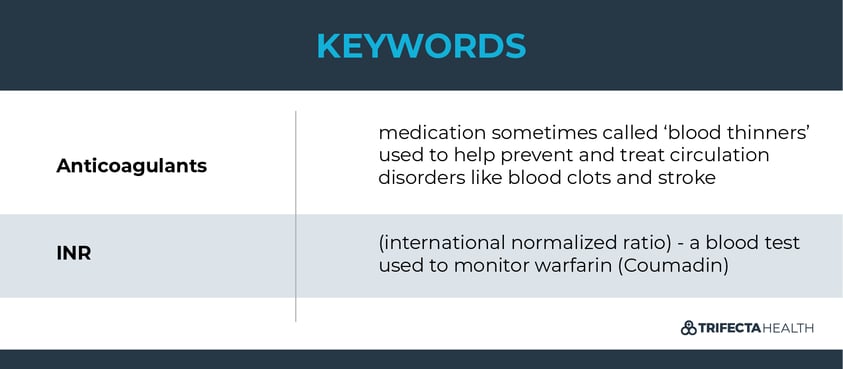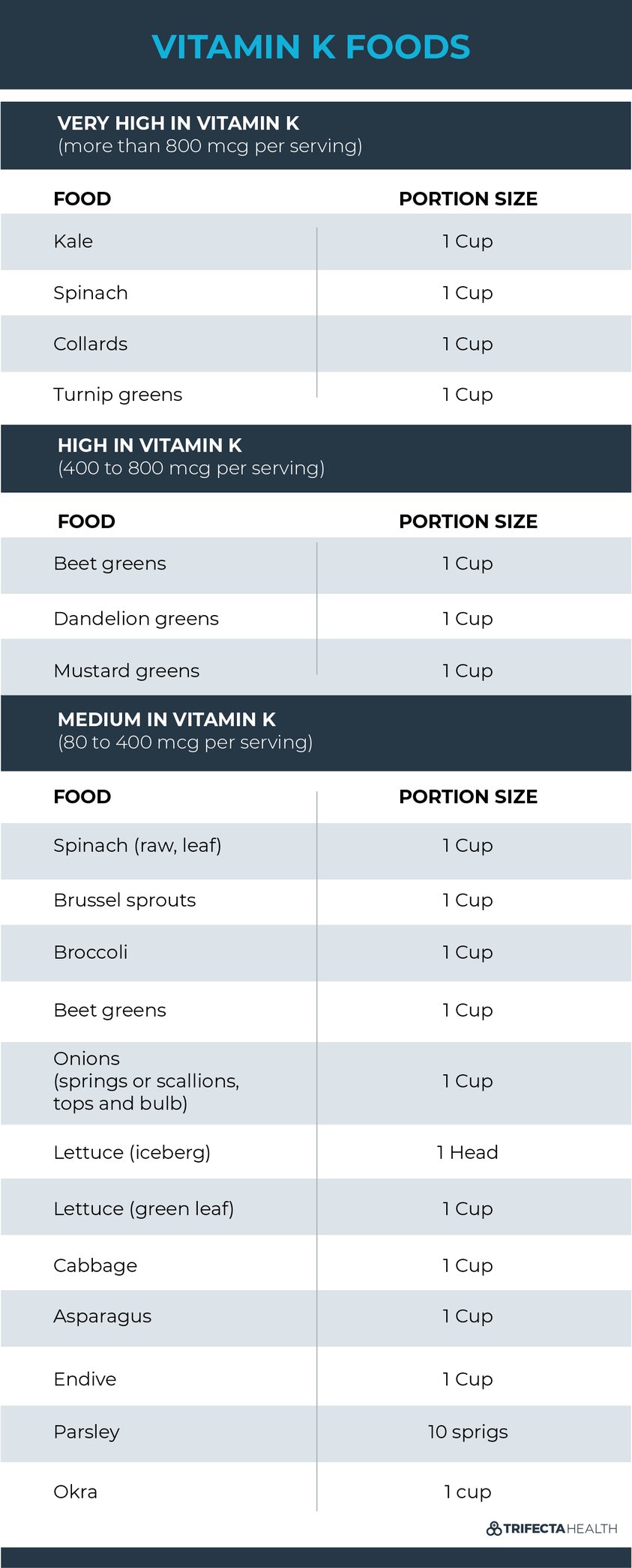If you or a loved one are taking the common blood thinner called Coumadin (also known as warfarin), you can’t miss these important food considerations that can be deadly if not carefully managed.
Here's your step by step guide on what to do with your diet on warfarin.
What is Warfarin?
Warfarin is an anticoagulant medication. It is sometimes referred to as a blood thinner because it is used to improve blood flow and treat blood clots.
Blood clots can cause many medical conditions including deep vein thrombosis, stroke, heart attack or other serious conditions like pulmonary embolisms and death of skin tissue.
Because warfarin is the generic name of the popular brand Coumadin, we will refer to the medication as warfarin throughout this article.
People who already have or are at a high risk for blood clots may be helped by taking blood thinner medications. However bleeding problems caused by these blood thinners can lead to life threatening side effects. Important information on how to prevent these adverse effects can be life saving.
Are Blood Thinners Dangerous?
The main risk of anticoagulant medications like warfarin is bleeding. This makes sense, as their goal is to prevent the body from forming too many blood clots.
Bleeding can be mild, such as bruising or extended bleeding from a small cut. However it can also quickly become dangerous.
People who take blood thinners are at a much higher risk of significant gastrointestinal bleeding and bleeding in the brain.
This risk is even higher after a fall or even mild trauma.
Why Take Blood Thinners?
As mentioned above, blood clots can cause devastating strokes as well as deadly lung conditions (ie: pulmonary embolism) that may be able to be prevented by taking anticoagulants like warfarin. Due to the high risk of bleeding however, starting these medications isn’t taken lightly.
Your doctor will likely use well established calculations to carefully determine your risk of blood clots to make sure the risk of developing a life threatening blood clot outweighs the risk of taking the medication. You should also be informed about these risks and benefits and be part of the medical care decision to start taking the medication.

What is INR?
INR (international normalized ratio) is the blood test we use to see how long it takes blood to clot while taking warfarin. The goal INR may be slightly different for each individual but is usually between 2-3. If the INR is too high, there is an unnecessary increased risk of bleeding. And if the INR is too low there is an increased risk of dangerous complications from clot formation.
Bottom Line: People taking warfarin need to have their INR checked regularly as many factors can affect how sensitive the body is to warfarin and even small deviations can be dangerous.
Why Are There Diet Concerns on Warfarin?
Warfarin works by blocking the activity of vitamin K in the body. This limits the ability of blood to form clots because vitamin K is required to make necessary clotting factors.
Vitamin K
The amount of vitamin K in our body can vary considerably depending on how much of it we eat. For any given dose of warfarin, eating more vitamin K will make it less effective at preventing blood clots and eating less vitamin K will make it more effective at thinning blood.
Warfarin’s dosing is adjusted to match your body’s unique needs. Therefore it can be increased or decreased to account for how much vitamin K you eat (and your other unique metabolic processes).
However once it is adjusted to the level that fits you, eating more vitamin K than your normal will make the medication less effective and increase your risk of blood clots. And eating less vitamin K than your normal will make the medication more effective at thinning your blood and increase your risk of bleeding.
Bottom Line: It's important to be consistent with how much vitamin K you consume while taking warfarin.
Alcohol
Alcohol use can also increase the risk of bleeding. The American Heart Organization recommends no more than 1-2 servings of alcohol for people who are taking warfarin (1).
Vitamins & Supplements
Other vitamins and herbal supplements can also significantly change the effectiveness of warfarin. For example the below all can alter how warfarin works and lead to dangerous consequences (2 ,3).
- Centrum®, One a Day®, or other multivitamins.
- Garlic.
- Ginkgo biloba.
- Green tea.
- Coenzyme Q10 (Ubiquinone)
- Dong quai
- Garlic
- Ginkgo biloba
- Ginseng
- Green tea
- St. John's wort
- Vitamin E
Bottom Line: It’s important to recognize and be consistent with how much daily vitamin K you include in your diet. Foods containing vitamin K as well as other supplements, teas and vitamins can be dangerous when on warfarin by either increasing your risk of bleeding or clotting. Excessive alcohol can also increase the risk of bleeding and should be avoided.
How to Eat Well on Warfarin
Dietary recommendations on warfarin include eating a consistent healthy diet with balanced vitamin K and avoiding food products that can influence how the medication affects your body.
Vitamin K on Warfarin
It’s still important to get some vitamin K in your diet. Remember, it’s all about consistently eating the same amount of vitamin K - not completely eliminating it from your diet.
It’s recommended that men consume approximately 120mcg vitamin K and women consume 90mcg vitamin K (4).
The chart below includes common sources and relative amounts of vitamin K provided by the NIH.

Some people choose to maintain consistent vitamin K intake by routinely eating the same nutrients daily. Others prefer allowing more variety in their diet by keeping charts like this nearby and calculating their daily intake.
Whichever way you decide to manage your diet, just ensure to be consistent with the vitamin K you eat while on warfarin.
Other Food and Drinks to Avoid on Warfarin
Other foods than may interact with warfarin that should be avoided include:
- Cranberries & Cranberry Juice
- Black Licorice
- Garlic
How to Take Warfarin Safely
While there are risks of bleeding on warfarin and other blood thinners, these medications can also be lifesaving for many people at high risk for serious disease. If you need to take warfarin, there are many ways you can make the medication safer for you.
1) Be Consistent with Vitamin K
Due to the powerful effect vitamin K has on warfarin, it’s important to be consistent with how much you consume daily to ensure you’re not causing a dangerous coagulopathy.
2) Minimize or Eliminate Alcohol Consumption
Increased alcohol consumption can contribute to an increased risk of bleeding for people who are on blood thinners.
3) Be Careful of New Medications & Herbal Supplements
Vitamin K isn’t the only substance known to interfere with warfarin. There are many medications (including antibiotics) and over the counter supplements (including vitamins) that can significantly alter the way warfarin works.
It’s never been more important to talk to your doctor about any new vitamins, supplements and medications you're taking to ensure they do not have an interaction with warfarin.
4) Take Your Medication as Prescribed
Because both too much and too little of the medication can be dangerous, it’s very important to take your medications as prescribed while on blood thinners. Take them exactly as directed and never take double the dose or change the dose of what you’re taking unless told to do so by your healthcare provider.
5) Frequent Blood Tests
It’s important to regularly check your INR while you’re taking warfarin. This allows your treatment team to change your medication dosing as needed to ensure your levels are at an effective range without imposing unnecessary risks on your health.
6) Prevent Injuries
Because the bleeding risk is so high and can be so dangerous, it’s important for everyone taking blood thinners to be extremely cautious to prevent injuries. Even minor falls can lead to life threatening bleeds.
Working with a support team of family, friends, physical and occupational therapists, and your doctors can all be helpful to create a safe environment at home and help make preparations for daily life that can significantly reduce injuries.
7) Seek Medical Attention with Bleeding
Bleeding can happen anywhere. If you notice any bleeding whether it is from your gums, stool, urine, skin or anywhere else it is important to see your doctor right away.